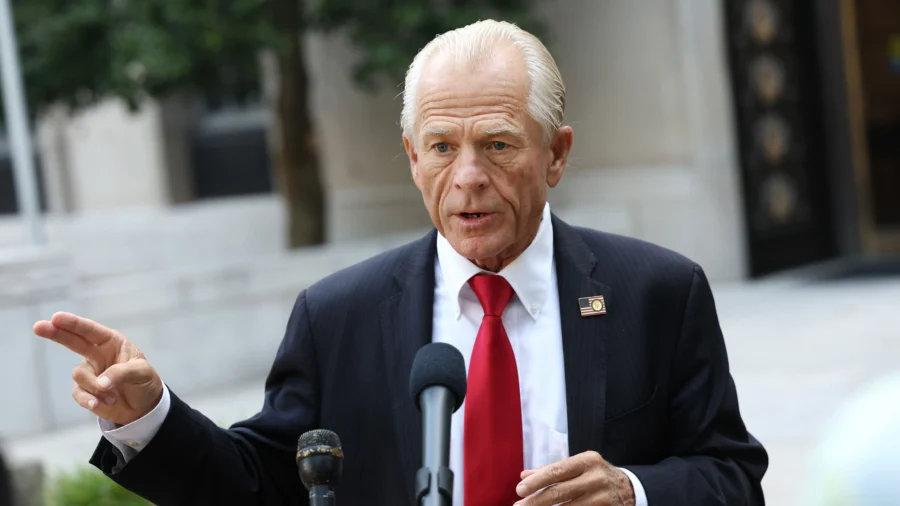The U.S. Department of Justice is seeking a year-long prison term along with fines for former Trump White House adviser Peter Navarro for his criminal conviction related to avoiding a subpoena request from the Jan. 6 committee.
In September, a federal court jury convicted Mr. Navarro of two misdemeanor counts for refusing to comply with a congressional subpoena to testify in front of the Jan. 6 committee and provide certain requested documents.
In a Jan. 18 memo submitted to the U.S. District Court of D.C., DOJ prosecutors alleged that Mr. Navarro “thumbed his nose at Congressional authority” with his refusal to comply with the subpoena. Instead of abiding by the Congressional request on a matter of “national importance,” Mr. Navarro “like the rioters at the Capitol, put politics, not country, first, and stonewalled Congress’s investigation.”
“The Defendant chose allegiance to former President Donald Trump over the rule of law even after being apprised that executive privilege would not excuse his default. For his sustained, deliberate contempt of Congress, the Defendant should be sentenced to six months’ imprisonment for each count—the top end of the applicable United States Sentencing Guidelines’ range—and fined $200,000.”
Mr. Navarro defied his Congressional subpoena under the argument that his communications with President Trump and with presidential staff were protected under executive privilege.
Executive privilege is the power granted to the president and other officials from his executive branch to withhold confidential information from the courts and legislative branch. The power is rooted in the separation of power doctrine which splits the American government into the three branches of legislative, judicial, and executive.
During a court hearing in August, Mr. Navarro said that President Trump made it “very clear” their conversations were covered by executive privilege. However, the judge ruled there was no sufficient evidence to confirm this.
In the Jan. 18 memo, prosecutors accused Mr. Navarro of cloaking his “bad-faith strategy of defiance and contempt behind baseless, unfounded invocations of executive privilege and immunity that could not and would never apply to his situation.”
Another memo written by Mr. Navarro’s lawyers pointed out that though the subpoena involved in the case stemmed out of events surrounding the Jan. 6 Capitol breach, the defendant’s trial is not about this incident. As such, his sentencing “should not reflect any relationship with the events of that day.”
History is replete with people who have “refused to comply with congressional subpoenas, and Dr. Navarro’s sentence should not be disproportionate from those similarly situated individuals,” they wrote.
“This Court has recognized that Dr. Navarro thought he had been instructed by a former president to invoke executive privilege rather than appear for testimony. Accordingly, Dr. Navarro respectfully requests the Court sentence him to not more than six (6) months of probation for each count, to run concurrently, and to pay a fine of $100 for each count.”
Mr. Navarro’s sentencing is scheduled for Jan. 25.
Executive Privilege Threatened
The memos come as D.C. District Judge Amit Mehta recently rejected Mr. Navarro’s request for a new trial in the case. Mr. Navarro argued that the jury that convicted him was prejudiced by protesters.
“Prior to reaching their verdict, these jurors found themselves face to face with protestors, and at least some of whom referred to members of the Trump administration or the events at the United States Capitol Building on January 6, 2021, as ‘terrorists’ and called for their conviction,” said the motion submitted by his lawyers.
“The jurors were exposed to this information at a crucial point in the proceedings, while their deliberations were ongoing but prior to a verdict having been reached. Nevertheless, mere minutes after their exposure to the scene outside the Courthouse, the jury returned its verdict convicting Dr. Navarro of both counts of contempt of congress.”
As such, only a new trial can ensure that Mr. Navarro’s case is heard by a jury that is “free from any prejudice.”
However, Judge Mehta denied the request, ruling that the defendant failed to prove prejudicial influence on jury members and waited too long to bring the motion.
At a press conference following the jury decision to convict him, Mr. Navarro called the trial “a landmark case that’s bound for the Supreme Court.”
“It’s about the constitutional separation of powers that goes back to the days of George Washington when the legislative branch first began to try to meddle with the executive branch,” he said.
“There are very good reasons why executive privilege is sacrosanct. It’s the mechanism by which effective presidential decision-making is made. So this case is not about me.”
John Rowley, one of Mr. Navarro’s lawyers, said that executive privilege was “part and parcel” of his client’s office and as such “no express invocation of privilege is even necessary.”
In a July 2022 opinion piece in Newsweek, legal scholar Alan Dershowitz criticized the Biden administration for making a “dangerous argument that threatens executive privilege, as well as other important and long recognized privileges.”
The purpose of executive privilege is to “encourage candid communications that are intended to remain secret.” However, with the Biden administration insisting that President Trump’s communications while in office can be waived by subsequent presidents, this would bring an end to executive privilege, he warned.
“That means President Joe Biden would not be able to assure his chief of staff or his secretary of state that their advice would not become the subject of a subpoena when the next president is sworn in. If a subsequent president is of a different party, he could play politics with the privilege and waive it in hopes of benefiting his party or reelection prospects,” Mr. Dershowitz wrote.
“No one would be willing to give a sitting president controversial advice if he knew the next president had the power to disclose it.”
From The Epoch Times


